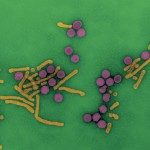Link to Pubmed [PMID] – 15315833
Vaccine 2004 Sep;22(27-28):3535-45
Recent efforts to design an human immunodeficiency virus type 1 (HIV-1) vaccine candidate have focused on means of eliciting anti-viral T-cell responses. We tried to improve the immunogenicity of DNA vaccines by designing hybrid DNA constructs encoding hepatitis B surface antigen (HBsAg) fused to antigenic domains of simian/human immunodeficiency virus (SHIV 89.6P). Immunisation with hybrid DNA induced both effector and long-lasting precursor T-cells. Following boosting with a recombinant modified vaccinia Ankara (rMVA) producing full-length SIV and HIV antigens, it appeared that priming with hybrid DNA had increased virus-specific T-cell responses in terms of both the number of virus-specific IFN-gamma-secreting T-cells and virus-specific lymphoproliferation. After intrarectal challenge with SHIV 89.6P, immunised animals demonstrated early control of SHIV 89.6P replication and stable CD4+ T-cell counts.

